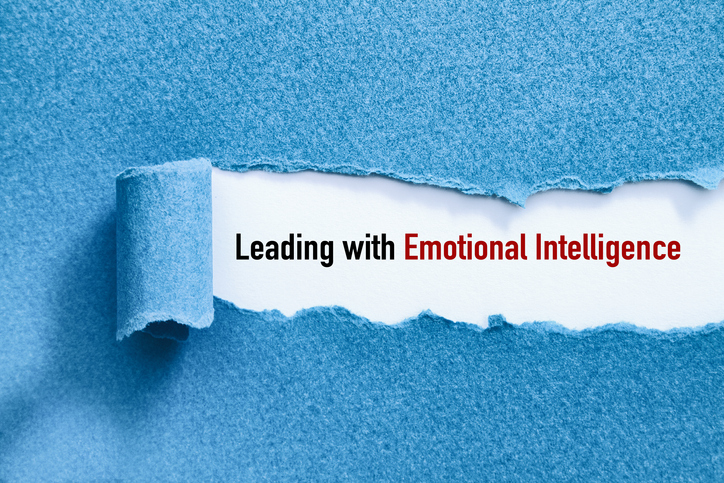Leadership: Emotional Intelligence and how the Mind Works
Brought to you by Concordia University, St. Paul – Criminal Justice Department


By: Janina Cich, MA
Department of Criminal Justice, Chair
Professor of Criminal Justice, Forensic Behavioral Health &
Trauma, Resilience Self-Care Programs
Every day, informal and formal leader decisions can be transformed by managing emotions during the conflict, communication, and collaboration, thereby becoming more confident decision-makers. All in all, if we understand the premise that the only things we can certainly control in life are our thoughts, emotions, and behaviors, we can effectively lead others and organizations from anywhere in the hierarchy.
Knowing how our minds work, we can intentionally influence patterns of thinking and feeling. When we intentionally evaluate our reality, it promotes better decision-making and improves our ability to accomplish goals.
Daniel Kahneman, a well-known psychologist, is primarily known for his work on Behavioral Economics, earning a 2002 Nobel Memorial Prize for developing the autopilot and intentional system concept related to our emotions and intuitions. This dual-processing concept focuses on the brain’s cognitive processes (amygdala) and rational thinking (prefrontal cortex) parts.
The Cognitive processes (amygdala) guide our daily habits, helping us make broad assumptions, judgments, and conclusions with little information, often resulting in snap decisions. It also helps us assess normality as a survival function prompting us to react instantly to dangerous life-and-death situations through the freeze, fight, or flight stress response. But, our emotions can often hijack our rational thinking, intuitions, and feelings and cause snap judgments, which are fast and powerful and sometimes lead us in the wrong direction.

We use the autopilot system most of the time during day-to-day activities; these are sped fast, involuntary, and based on intuitions and habits.
Autopilot System = Emotions and Intuitions
- Fast and broad processing
- Learns from experience to make intuitive decisions
- Functions effortlessly
- Complete mathematical calculations
- Run from danger
- Understand simple sentences
- Complete phrases (i.e., ketchup and…)
- Automatic thinking, feeling, and behavior habits
- Distinguishes normal from surprising
- Consistently makes sound decisions
- Yet, they are reliant on informational shortcuts and prone to predictable and systematic errors
- Recognize Stereotypes
Both systems bridge a cohesive whole; the autopilot system relies on the cognitive process (amygdala), whereas the intentional system reflects our rational thinking (prefrontal cortex), the commonly used part of the thinking system where we handle complex mental activities (managing relationships, logical reasoning, rule-based thinking, learning new information, and habits of thought and behavior. While they are not all bad, they can be mentally fatiguing, susceptible to burnout, to intentionally thinking about our every action and decision, every moment.
Intentional system = Rational Thinking
- Conscious, reasoning, mindful-self
- Requires deliberate effort to stimulate or switch on, causing mental energy depletion
- Complete lengthy forms
- Comparing two products to determine the best value
- Learning new information that uses logic and reasoning skills
- Monitoring how to act during social situations
- Employ self-control and make rational decisions
In a nutshell, it takes no conscious effort to function the automatic system, but using a deliberate approach to switching on the intentional system can be mentally tiring.
The long and the short of it is that you have the potential to use the intentional system to alter your automatic thinking, feeling, and behavior patterns to help effectively handle challenges and stressors that everyday life presents. This deliberate skill empowers us to take charge of our lives, develop strategies to reach goals, and achieve life success.
Strategies to intentionally influence thinking and feeling patterns:
- Self-regulation: Adaptively control emotions, cognition, and behavior to respond effectively to internal and external or environmental demands (i.e., regular bedtime routine, goal setting, positive self-talk, identifying and reducing stress triggers)
- Focused attention: directing and sustaining attention on a particular moment, object, or person and intentionally disengaging from distractors (e.g., mind-wandering, daydreaming) and returning your attention to the moment, object, or person
- Emotion regulation: Influence your negative and/or significant emotions (i.e., noticing feelings, reframing a challenging situation, focusing on self-soothing reasons to feel happy or calm)
- Being Mindful: Intentional self-awareness that emerges when paying attention, non-judgmentally, to the present moment
- Mindfulness-meditation: Intentional awareness of present-moment experiences, focusing on curiosity, openness, acceptance, nonreactivity, and non-judgment.
- NOTE: Not all meditation is mindfulness, and vice versa.
The ability to lead effectively requires vast skill sets; recognizing and controlling your thoughts and managing and adjusting your behaviors are aptitudes that will promote healthy relationships, productivity, and success.
How will you manage your feelings and adjust your behavior as a 21st Century Leader?
About the Author:
Janina Cich, MA, is a retired Law Enforcement Officer with two decades of Criminal Justice experience and serves as the Criminal Justice Department Chair at Concordia University, St. Paul. She is a professor in the Criminal Justice & Forensic Behavior Health & Trauma, Resilience Programs, MN Law Enforcement Skills Program, and has been instructing at local colleges and universities since 2003. Janina is a frequent lecturer for various professional entities. She conducts Crisis Intervention Training and coaching for law enforcement and mental health practitioners, focusing on awareness, assessment, intervention, de-escalation techniques, and prevention approaches for mental health populations in the criminal justice system. She currently serves as the Chief Operating Officer of the American Institute for the Advancement of Forensic Studies (AIAFS). She has co-authored several Criminal Justice and Forensic Mental Health articles and book chapters. She serves as a peer-review member and editor of the Forensic Mental Health Insider (FMHI). She also serves as a Board Member on many non-profit organization boards.
